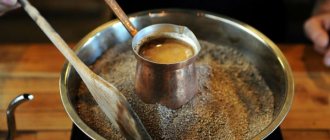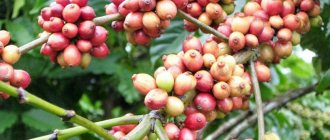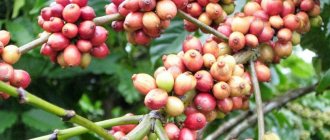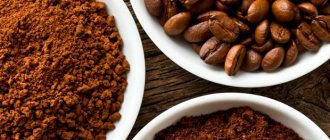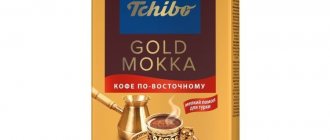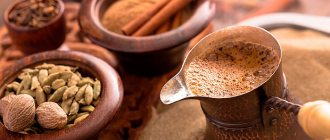Dear readers of my blog! I give you a simple Russian hello!
Having talked, not long ago, about Turkish tea, I was drawn to talking about Turkish coffee
Surely, everyone who has been to Turkey has tried Turkish coffee at least once. Not the kind that coffee machines dispense at Swedish breakfasts in Turkish hotels, but the real thing, brewed according to all the rules in a Turk.
Some will say that this is an indigestible drink, and even in apothecary volume, but for others it is a divine drink.
Be that as it may, there is no doubt that Turkish coffee is the same brand as Turkish men or Turkish clothing, representing a special way of preparing and serving coffee, and not at all a variety collected in Anatolia.
Coffee trees are capricious plants and do not grow anywhere. Give them special conditions like volcanic soils and stable temperatures.
The climate of Turkey, dearly loved by our compatriots, turned out to be not to their liking, so the Turks’ attempts to grow coffee in Mersin, Antalya and Anamur were not particularly successful.
In any case, commercial volumes of beans have not yet been collected, and therefore Turkey continues to import raw materials from the “coffee” continents - Latin America and Africa.
How to brew Turkish coffee?
At first glance, it may seem that the process of making Turkish coffee is a simple matter. All you need to do is pour the ground grains into the pot and put it on the fire. No!
Everything is much more complicated, and if you want to brew real Turkish coffee, and even with foam (this is actually aerobatics!), then you should take into account many nuances. First of all, the coffee should be fresh and very finely ground, the Turk (also known as “cezve” in Turkish) should be copper, the water should be cold, and the cups should be warm.
Only if these conditions are met, the drink will turn out tasty and aromatic. The ingredients are added to the Turk at the rate of two teaspoons of coffee per cup of water and one cube of sugar if you are planning a slightly sweet drink (az şekerli), one and a half to two cubes for a medium sweet drink (orta şekerli), three for a sweet drink (şekerli). You can also do it without sugar (sade).
The thoroughly mixed contents of the Turka, along with itself, are placed on the stove and cooked exclusively over low heat. Only in this case will its taste be rich and the foam thick. You will have to remove it often and little by little, laying it out in cups.
So be patient and arm yourself with a teaspoon. On average, this process takes 7-8 minutes. And only after the boiling coffee is poured equally into the cups with a deft movement of the hand, you can exhale, relax and step away from the stove
Among the variations of Turkish coffee, many people love coffee with milk, which has nothing in common with cappuccino or latte, coffee on coals and coffee on sand. The latter option differs from the drink prepared over fire in the deep and rich taste of the drink, thanks to the uniform heating of the Turka. And purely visually, a Turk buried in the sand with bubbling liquid is interesting for fans of oriental flavor.
Reviews
Olga: I love real coffee, strong, with bitterness, which invigorates well. I brew either espresso in a coffee machine or Turkish in a coffee pot. I even bought special coffee for this – Efendi. It is inexpensive, with good taste and aroma. I really liked it.
Mila: I really like the procedure of preparing coffee on sand and serving it in these tiny oriental glasses. But this can only be seen in colorful Turkish cafes, where the atmosphere is different and so are the people.
Ivan: I always make coffee using a Turkish coffee pot, I don’t accept other methods, but I don’t use finely ground beans, I don’t like sediment in the cup, I prefer medium-ground ones.
Julia: I am an experienced coffee lover, I have tried many national drinks, but I have not encountered the authenticity that the entire procedure of preparing and drinking coffee in Turkey has anywhere else. I would like to plunge into this pleasant atmosphere again.
How do they drink coffee in Turkish?
A drink that takes quite a long time to prepare, a priori cannot be drunk in a hurry, and therefore not a single important meeting or intimate conversation is complete without a cup of Turkish coffee.
The freshly brewed, scalding drink is savored in small sips, imbued with a rich taste and special aroma.
Turkish coffee, like tea, is served in special small cups with a couple of cubes of Turkish delight or chocolate on a saucer and a glass of water, a sip of which, taken before tasting the coffee, will refresh the taste buds.
Drinking water afterwards will not only refresh your mouth, but will also keep your teeth white. But it’s better to take a break between drinks, otherwise the hospitable host will doubt his culinary abilities and will be upset.
You just don't know how to cook it!
I’ll tell you my recipe for how I brew Turkish coffee at home on an electric stove.
The first thing you need to forget is Soviet recipes for brewing coffee! Granny recommended heating ground coffee in a Turkish coffee pot. And then bring it to a boil 3 (as much as three!) times. These methods add bitterness to the drink and simplify the aroma. The recommendations of the Soviet era are related to the fact that coffee was generally of low quality and in order to achieve at least some taste it was recommended to brew it this way.
Turkish coffee “Mehmet Efendi” (and other Turkish coffee) has a fine, fine grind, no additional steps or dances with a tambourine are necessary.
Girl with a Turk (photo for illustration)
Traditions associated with Turkish coffee
1. The difficult life of a Turkish bride.
On the day when the groom with two dozen relatives arrives (however, at a pre-agreed time
It is clear that in our age of high technology, many Turkish families have acquired coffee machines in order to simplify their lives, including in case of invasion by guests. But in this situation, all the intrigue is lost.
The bride herself tests the groom's strength by adding salt, pepper, lemon and generally everything that comes to her mind to his coffee. He, poor fellow, must drink this potion without wincing, otherwise he will never see the young lady like his own ears. In general, an extremely thoughtful test
2. Fortune telling on coffee grounds.
In almost every Turkish company there is a person who “knows how to read the tea leaves” and who is asked to do this over and over again by everyone who is not too lazy. The essence of fortune telling is to decipher the coffee patterns on the walls of the cup and saucer.
The cup with coffee grounds is first turned upside down on a saucer to drain the remaining liquid.
If there is no such person in your environment, and finding out your future passion is like hunting, you can turn to the services of professional fortune tellers who sit in coffee shops. Often their services are already included in the purchased cup of coffee, which will not prevent them from asking you to “gild” the pen at the end of the sacrament of fortune telling
Instructions in pictures
Below are pictures with the stages of coffee brewing
10 grams of coffee per serving (2 teaspoons)
100 ml water per serving
Added and stirred, some of the coffee may float on top
We wait until the head of foam rises and immediately remove
Let it sit for a couple of minutes
Perhaps you have your own coffee recipes and recommendations for other Turkish coffee brands. Write in the comments.
We recommend that you read:
If you find an error, please select a piece of text and press Ctrl+Enter.
Source
Turkish coffee: TOP 8 popular brands
Kurukahveci Mehmet Efendi Türk Kahvesi
In the 19th century, Turkish coffee was sold in beans that customers roasted and ground themselves by hand. In 1871, Mehmet Efendi, who inherited the business from his father, made a name for himself by starting to sell it already ground, causing the streets of Istanbul to be filled with a new aroma.
Today, Kurukahveci Mehmet Efendi brand coffee is not just among the leaders, but No. 1 in Turkey.
Price per 100 g: about 5 rounds. lira (or at the exchange rate of about 80 rubles).
Nescafe
This brand needs no introduction, because the whole world is entangled in its coffee chains. In today's crazy pace of life, an instant instant drink has become an unconditional alternative to the traditional “get-together” drink.
In the minds of the Turks, the name of the Nescafe brand over the many years of its existence on the Turkish market has become so closely intertwined with the concept of instant coffee that it has become a household name, like, say, “copier”.
Price per 100 g: 15 – 30 round. lira (240-480 rub.).
Jacobs Monarch
The German brand, which appeared on the Turkish market in 1995 with instant and filtered coffee, has strengthened its position and won the love of Turkish coffee lovers thanks to its excellent taste and aroma. Which, in principle, is not surprising, that’s why he’s German.
Price per 100 g: 15 – 30 round. lira (240-480 rub.).
Kahve Dunyası Türk Kahvesi
The Istanbul-based company, which opened its first coffee shop in 2004, quickly achieved a level of fame where the brand name is passed on by word of mouth with accompanying praise.
The fame of Kahve Dünyası coffee has spread far beyond the country, thanks to the opening of stores in England, Romania, Saudi Arabia and Kuwait.
Unlike many other Turkish manufacturers, this company, in addition to ground Turkish coffee, also produces filtered and instant coffee.
Price per 100 g: 5 – 7 round. lira (80-112 rubles).
QUESTION FOR RELEASE: WHO INVENTED THE FAMOUS ALL INCLUSIVE SYSTEM?
Hint: he is Turkish. But still no one has answered
If you are the only one or the only one who knows, write to the author of the site, he is eager to meet you.
If not, just read the article about this Great Man and his Fate at the link.
Hisar Kahve 1928
The company, which began its existence in 1928 from a small coffee shop, uses the experience of generations and modern technologies to create a traditional Turkish drink.
According to the manufacturer of the Hisar Kahve 1928 brand, in the very near future they plan to gain the preferences of coffee fans in an unprecedented way not only in Turkey, but also abroad.
Let's see how it works out for them.
Price per 100 g: 5 – 7 round. lira (80-112 rubles).
Cezbeli kahve
Despite its relatively young age, only 8 years, this Istanbul brand has already gained a reputation for quality coffee, thanks to the manufacturer’s use of only ideal Arabica beans, as stated on the packaging “100% Arabica”.
Portion bags will allow you not to part with your favorite taste for a minute.
Price per 100 g: 5 round. lira (80 rubles).
Nurettin Kocatepe Türk Kahvesi
The coffee business, which began in Ankara as an adventure, led to the creation in 1949 of an entire company called Kocatepe 1949, which combined the accumulated knowledge and experience to improve the quality of its products.
The promising motto is especially pleasing.
Nurettin Kocatepe brand coffee, despite the intense roasting of the beans, has a mild taste that evokes conflicting emotions among lovers of the classics.
Price per 100 g: 5 – 7 round. lira (80-112 rubles).
Raw materials and production of the company in Turkey
Only used for the production of Mehmet Efendi coffee. Grains of different varieties are purchased from Asia, Africa, and America. Each type of raw material is fried separately, and then tasters and blenders create mixtures (blends) that differ in taste and strength. One mixture includes up to 7 different varieties.
The store in Istanbul is still open today. There, like 150 years ago, everything is done by hand. The beans are roasted in roasters and ground in large coffee grinders in full view of customers. They say that you can find a store with your eyes closed by its wonderful aroma.
Coffee in Mehmet Efendi's shops is still roasted and ground by hand.
The factory produces coffee for sale in large retail chains in Turkey and export to more than 50 countries. Here all processes - roasting, grinding, packaging - are automated.
Range of ground coffee from Mehmet Efendi
In Russia, Mehmet Efendi coffee can be bought ground or in beans. A premium soluble product called Black Gold has been produced since 2016, but is currently exported only to Germany.
Coffee from this brand is supplied to markets in ground form and in beans.
Ground and bean coffee is packaged in cylindrical cans and foil bags.
The brand's assortment is represented by four product lines. They differ in the method of preparation and taste.
Turkish – grains ground into dust
Traditional Turkish coffee, with which the development of the brand began. This is a tart blend of several varieties of Colombian Arabica. Heavily roasted grains are ground finely into dust. The result is a thick, syrupy drink with bitterness, notes of burnt bread, caramel, and spices. Ideal for cooking in a Turk.
